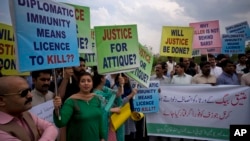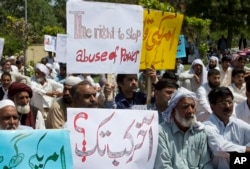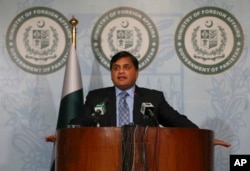Pakistan said Thursday talks with the United States are continuing to resolve recent mutual diplomatic quarrels and justified its decision to allow an American diplomat involved in a fatal traffic crash leave the country.
Colonel Joseph Emanuel Hall, a defense attache at the U.S. embassy, ran a red light and killed a motorcyclist in Islamabad on April 7.
Hall left Pakistan on Saturday, a day after authorities blocked him from boarding a U.S. military plan because of pending criminal investigations against him.
Foreign Ministry spokesman Mohammad Faisal on Thursday dismissed criticism that Pakistan bowed to U.S. pressure and allowed a "murderer" to flee the country.
"It was not an outcome of any quid pro quo," he explained. "We permitted him to leave the country because diplomats enjoy immunity from all prosecution and trial under criminal or administrative law."
He added that the decision was taken because the Islamabad court that was looking into Hall's involvement in the road accident had left it for the government to determine the diplomat's fate in view of the immunity he enjoyed.
"Americans have assured us that he will be tried in a criminal or administrative court in the U.S.," Faisal said. "We have also shared the evidence our police have collected with Americans for trial in America."
Bilateral tensions
The controversy surrounding the U.S. diplomat fueled bilateral tensions in a month when Washington imposed travel restrictions on Pakistani diplomats, prompting Islamabad to take similar measures.
Faisal spoke in detail for the first time on Thursday about the restrictions, saying they fully went into effect on May 11.
"The [Pakistani] diplomatic staff and their families will now have to seek prior permission for traveling outside the radius of 25-miles, approximately 40 kilometers," he explained. "As a matter of reciprocity, U.S. diplomats in Pakistan have also been asked to seek prior permission for movements exceeding 25-miles limit."
The spokesman downplayed the tit-for-tat action, however, saying diplomats on either side are not barred from traveling beyond a 40-kilometer radius.
"A procedure has been put in place for them to seek prior permission and when it is granted they will be able to travel beyond the limit," he said.
Faisal noted that Pakistan and the U.S. are engaged in talks over the issue. He clarified the travel restrictions are not applicable to official and political visitors from Pakistan and the U.S.
"We hope that the matter can be resolved through dialogue," he said.
Downgrading US privileges
In addition to retaliatory travel limits, Pakistan also has withdrawn a set of key concessions it had granted U.S. diplomats to boost privacy and security of their operations. They are no longer allowed to use vehicles with tinted glass.
Also, American diplomats would not be entitled to special treatment at airports, and their cargo would have to be scanned like that of other passengers.
Additionally, they have been barred from "installing radio communication at residences and safe houses" without prior government permission.
"Some concessions were given by earlier [Pakistani] governments," the Foreign Ministry spokesman said. "Details of these concessions were never made public. These concessions are not being given anymore."
Pakistan had granted the concessions to the U.S. after after joining the "war on terrorism" 17 years ago.
Traditionally distrustful relations between Washington and Islamabad have deteriorated further since last August when President Donald Trump announced his South Asia strategy. The Trump strategy blamed Pakistan for not taking action against terrorists on its soil who were plotting attacks on U.S. forces in neighboring Afghanistan.
In January, Trump suspended all military aid to Pakistan accusing the country of "giving us nothing but lies and deceit."
Islamabad rejected the charges and maintains Washington is scapegoating Pakistan after failing to secure and stabilize Afghanistan.
Analysts do not foresee a complete breakdown in bilateral ties, though, mainly because U.S. and NATO rely heavily on Pakistani air and ground lines of communications for ferrying supplies to their troops in Afghanistan.
In the wake of deterioration in its relations with Washington, Islamabad's efforts to improve ties with old foe Russia have been warmly received by Moscow. Pakistan's ties with traditional ally China also have seen unprecedented improvement in the past few years.






